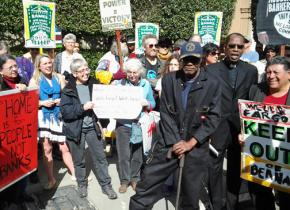Wells Fargo, you’re evicted
and report on Occupy activists' visit to a bankster's home.
MORE THAN 100 protesters gathered outside the home of Wells Fargo CEO John Stumpf on February 11 in the ritzy San Francisco neighborhood of Russian Hill to serve him a foreclosure notice.
Organizers of the protest, which included activists from Occupy Bernal, Occupy San Francisco and the Alliance of Californians for Community Empowerment (ACCE), gathered to call for a meeting with Stumpf in order to demand loan modifications and principal reductions for a number of foreclosure fighters and to put a stop to foreclosures and evictions.
During the action, a number of people fighting foreclosures read from a mock "notice of default" that explained how Stumpf has destroyed the economy and ruined the lives of the 99 percent.
Foreclosure fighters then delivered the notice to Stumpf's door and asked the beefy security guards there to allow them to take it inside. When this proved impossible, the guards accepted the notice on Stumpf's behalf.
Alberto, who faces eviction from a home that his family has owned for 30 years, spoke about the importance of protest. After pressure, a Wells Fargo executive recently flew from Texas to meet with him, resulting in a 90-day stay of his eviction.

"We are here to serve a notice of default," Alberto said. "You collected $43 billion of taxpayer money as well as unknown amounts from Federal Reserve at some later date, and since made record profits at the expense of low-income communities."
A few days before the protest, ACCE and Occupy Bernal helped a homeowner in the Excelsior neighborhood get a reprieve from eviction threatened by Fannie Mae, a mortgage that originated with Wells Fargo.
AFTER DELIVERING their mock notice of default, activists led a mock auction of the home, dramatizing how banks steal and then sell off people's homes, A 10-foot puppet of Stumpf contested the foreclosure proceedings. Archbishop Franzo King of the Church of John Coltrane and THE ACCE declared, "Mr. Stumpf, your days of Stumpfing on the poor are over."
Protesters chanted, "We don't die, we occupy!" and "We ain't foolin', this ain't no fiction. No foreclosures, no evictions!"
Dexter Cato lives in the predominantly African American Bayview/Hunter's Point neighborhood, which has seen 1,500 foreclosures over the past four years. He is scheduled to be evicted from his home this Wednesday. "We aren't going for this. We're fed up," Cato said. "I've lived in the Bayview for the last 40 years. I have four kids, and I just lost my wife...I did everything I was supposed to do, and now I'm out."
The hardship that Cato is facing stands in stark contrast to Stumpf, who earned more than $17 million in total compensation in 2010. His company, Wells Fargo, earned record profits last year, earning $4.1 billion in net income during the fourth quarter alone. Wells Fargo was one of the banks bailed out by the federal government, receiving some $43 billion.
But while the large banks have returned to profitability, homeowners are still receiving little relief. Some 2 million Californians are in foreclosure.
A damning new report commissioned by San Francisco Assessor-Recorder Phil Ting that studied a sample of 400 foreclosures between January 2009 and November 2011 has shined a spotlight on the practices of the big banks.
The report found that 84 percent of foreclosures contained clear violations of the law. These violations include forging signatures, fraud and failing to notify borrowers of changes in the owners of their mortgages. "It is not impossible that there are homeowners who are alleged to have defaulted on loans to which they never fully agreed to and, further, are being foreclosed upon by lenders that might not even own such loans," the report stated.
Despite this, the banks show few signs of stopping foreclosures. In a welcome move, California Attorney General Kamala Harris recently called on Fannie Mae and Freddie Mac to stop foreclosures and offer principal reductions to those already in foreclosure.
But no local or state public official has yet taken any action that can force the banks to keep people in their homes. Activists plan to continue pressuring banks and public officials to keep their neighbors in their homes.


